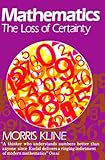From Amazon: "This work stresses the illogical manner in which mathematics has developed, the question of applied mathematics as against 'pure' mathematics, and the challenges to the consistency of mathematics' logical structure that have occurred in the twentieth century."
From goodreads.com: "Most intelligent people today still believe that mathematics is a body of unshakable truths about the physical world and that mathematical reasoning is exact and infallible. Mathematics: The Loss of Certainty refutes that myth."
Edit: This was also interesting: https://www.youtube.com/watch?v=RlMMeqO7wOI , a video by Stephen Wolfram. I know he is often criticized for various reasons, but much of what he says makes intuitive sense.
- The Facebook Effect -- well-written insider's account of the history of Facebook and its ambitions. http://www.amazon.com/Facebook-Effect-Inside-Company-Connect...
- The Quantum Enigma -- an accessible digest of quantum mechanics and its philosophical consequences. http://www.amazon.com/Quantum-Enigma-Physics-Encounters-Cons...
- Flesh & Machines -- a lightweight history of robotics and some wacky speculations by MIT's Rodney Brooks. http://www.amazon.com/Flesh-Machines-Robots-Will-Change/dp/0...
- The Language of Life: DNA and the Revolution of Personalized Medecine -- a well-backed account of what is or will be possible in medicine thanks to a better understanding of the genome and increase use of DNA sequencing for prevention, diagnostic, and treatment. http://www.amazon.com/Language-Life-Revolution-Personalized-...
- ... by David Sedaris -- Funny short stories. Perhaps The Santaland Diaries for something light but really amusing, and When You Are Engulfed in Flames for something darker and more well-known. Also, if you like short stories, I heartily recommend Children Playing Before a Statue of Hercules, a varied collection of short stories selected by Sedaris. http://www.amazon.com/David-Sedaris/e/B000AQ3YUW/ http://www.amazon.com/gp/product/0349119759 http://www.amazon.com/When-You-Are-Engulfed-Flames/dp/031615... http://www.amazon.com/Children-Playing-Before-Statue-Hercule...
- Dreams of My Father -- Barack Obama writes candidly and beautifully about his childhood and early adulthood; it's not a political book, and it's worth reading for the writing alone. http://www.amazon.com/Dreams-My-Father-Story-Inheritance/dp/...
- Mathematics: The Loss of Certainty: a chatty history of mathematics, and its perception. http://www.amazon.com/Mathematics-Loss-Certainty-Galaxy-Book...


The book is a non-academic tour of the history of mathematical foundations, and the way mathematicians struggled to rediscover "truth" or the purpose of their work when new crises were reached. For example, the book spends a good deal of time explaining the centrality of Euclidean geometry to people's worldviews, and the way that the discovery of non-Euclidean geometries shook people. Not just because they didn't assume other geometries could exist, but because people believed geometry to map onto Euclidean physical reality because it was God's way of revealing Himself to the world.
The other main crises that the book toured were the discovery of quaternions, Cantor's theories, and Godel's theorem.
Kline ends describing the arc over the last two hundred years of math as a splitting-off into four different schools: set theorists, intuitionists, formalists, and logicists. Each camp tried to reassert math on "solid ground". I hear echos of those debates in this thread, where some are asserting that there can possibly exist multiple foundations, which from my reading of the book is a very formalist idea (our rules of math are a formal system, and any internally consistent set of rules are just as valid as objects of study).
Not being a mathematician, I don't have a sense of where those schools played out to the current day. I'd be curious to hear if they're all still around in different forms, or whether some have more or less died out.